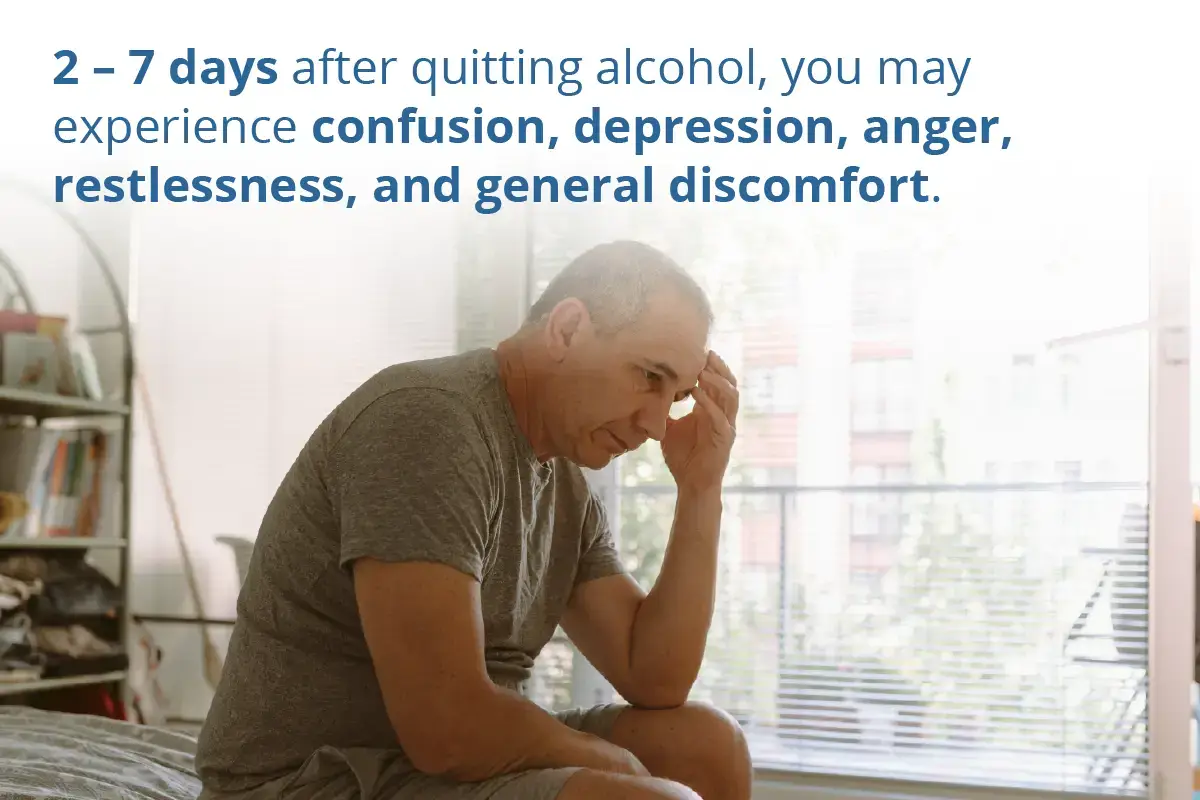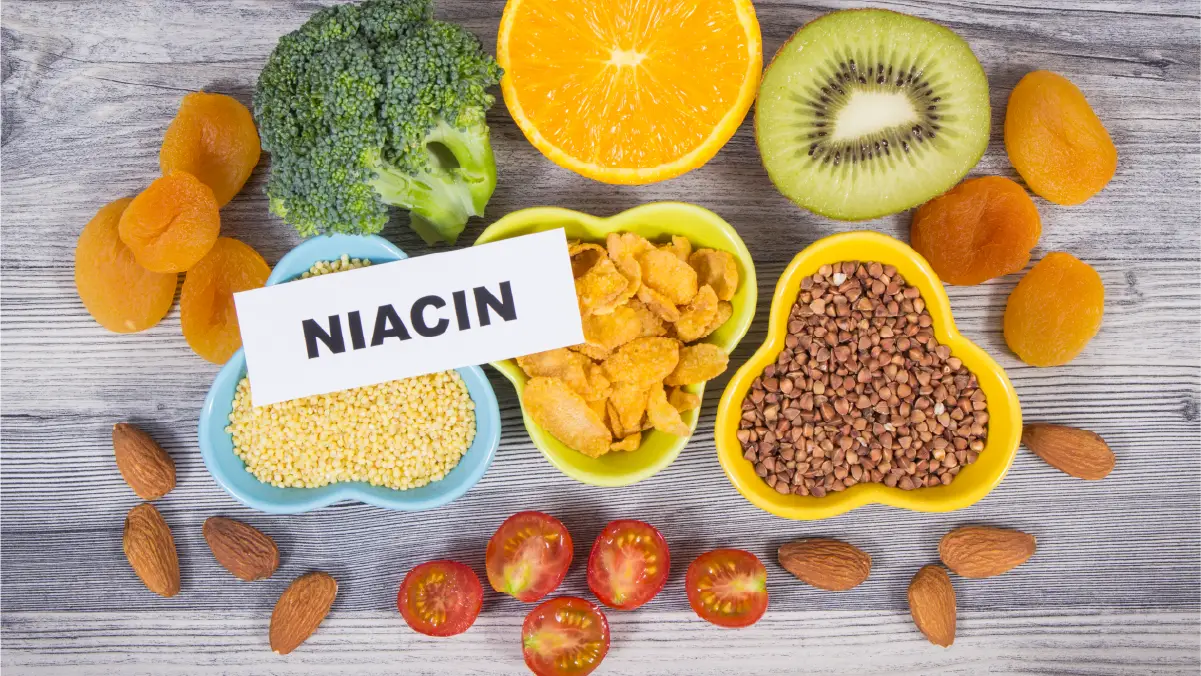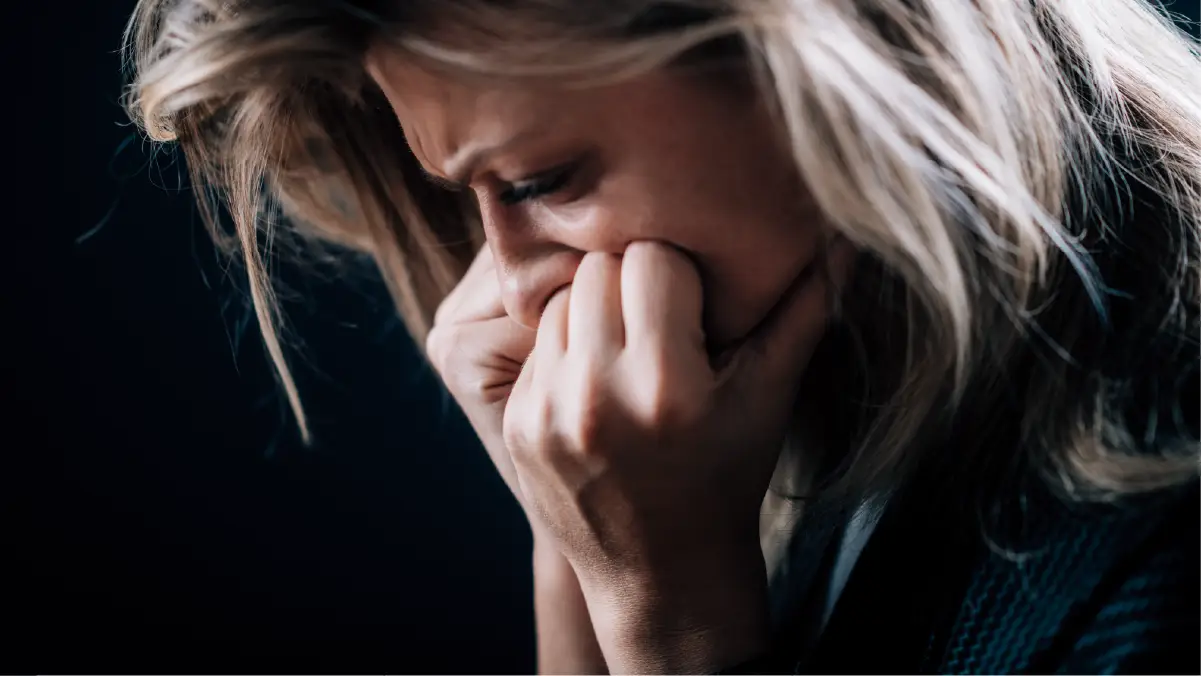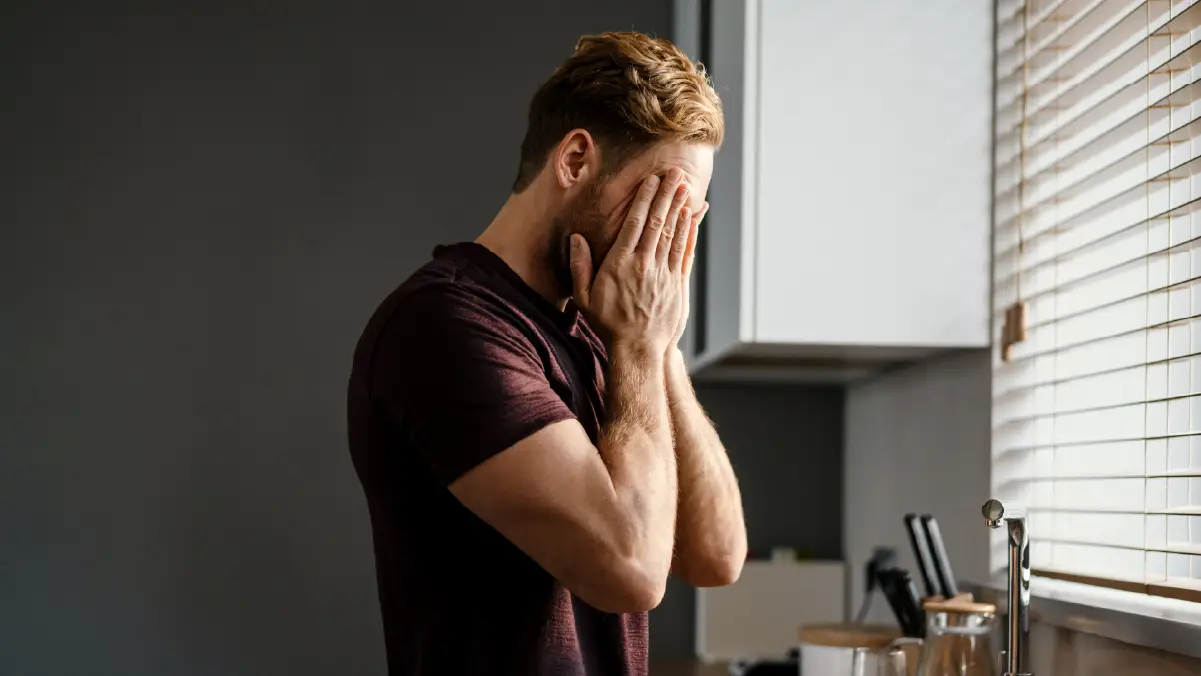
If you’re even a ‘casual’ drinker, there’s a good chance you’ve experienced some alcohol withdrawal symptoms. If six to twelve hours after an episode of drinking you’ve ever experienced trouble sleeping, tremors or shakes, extreme anxiety, a craving for even more alcohol, or any of the symptoms of a hangover, (think headache, nausea, sweating, that overall ugh-I-have-to-call-out-of-work feeling), then welcome to the not-so-great club. You’ve experienced alcohol withdrawal, so be it a mild version.
For those considered alcoholics, those who drink alcohol excessively and/or problematically, withdrawal symptoms become much more severe. This is why we want to be straight-up with you and let you know right off the bat that quitting alcohol as an alcoholic is hard. The symptoms mentioned previously are all more likely to occur within the first six to twelve hours after stopping.
Those six to twelve hours afterward make up phase 1 of something called a detox timeline. A full detoxification from alcohol for a heavy drinker usually takes a full week. That is NOT to say that alcoholism or the addiction to drinking is cured in that time. This is ONLY to say that the human body completely rids itself of the presence of alcohol in approximately 7 days.
Throughout the course of this detox week, different phases of alcohol withdrawal symptoms may occur. In general, there are four phases, the first of which has been briefly discussed already:
Most of the rest of this article will consider the four phases of the detox timeline, followed by some facts and thoughts to reassure you, or whoever is quitting alcohol, that the correct decision is being made. Seven days of withdrawal is well worth preventing a lifetime of alcoholism. Over 85,000 Americans die every year due to alcohol-related causes. Those seven hard days are very much worth becoming a statistic. Let’s take a look at this seven-day period, starting with a more in-depth look at phase 1 of the detox timeline. You should know what you’re getting into and why.
Prolonged alcohol abuse causes overall brain function to slow down. It’s a bit more complicated and intricate than that, but essentially the brain becomes used to running in an altered state, a state with less brain activity than normal. Stopping drinking causes brain activity to pick up again and it happens in a rush. The brain enters a state of hyperactivity, increasing nerve cell activity, resulting in tremors. It can be a minor hand shake, a full body shake, or anything in between.
Everybody has some level of anxiety – it’s just that the majority of people do not have a problematic level of anxiety. Those who suffer from diagnosed anxiety and are alcoholics will suffer more severe anxiety when quitting drinking. However, quitting drinking exacerbates all levels of anxiety. The brain contains countless cells called neurotransmitters, which basically carry messages from the brain to the rest of the body, allowing us to do everything from eat and breathe to paint a canvas. There are many different types of neurotransmitters. Alcohol distorts the levels of these cells, along with serotonin levels, which can ultimately worsen anxiety.
In fact, twenty percent of those with social anxiety disorder also suffer from an alcohol abuse problem. Furthermore, seven percent of all Americans use alcohol to cope with some form of anxiety. It’s obvious the two are related beyond both starting with the letter ‘a’.
You’re quitting an addictive substance. It makes sense that part of the first phase of detox is a want for more. However, with alcohol it goes beyond needing a fix. Alcohol is unique in the sense that we do not become addicted to beer or wine or liquor itself; we become addicted to the changes in the brain that ethanol causes. This is why you’ve heard about people chugging mouthwash in times of desperation. There is usually a high ethanol content. The chances are that a desire for more alcohol 6 – 12 hours after stopping is in reality one of two things: a drunken plea for more unneeded booze or a coping method for one of the other symptoms mentioned prior. Either way, drinking more at this point, even a half a shot, sets you back to square one.
Note that along with the symptoms mentioned next, a continuation of the previous phase’s symptoms may also occur/be occurring during this phase. The same goes for each phase transition.
The reason quitting can cause a loss of appetite and/or malnutrition 12 – 24 hours later is really quite simple. Most alcoholics either don’t eat enough, or eat extremely unhealthily. These tend to become habits, just like the drinking itself. After stopping, if you were someone who didn’t eat much, you will likely experience loss of appetite, and if you were someone who ate unhealthily, you may begin to experience malnutrition. These symptoms can be a result of past eating habits and/or a continuation of the habits.
An insufficient amount of water in the body occurs not too long after drinking begins, actually, but the worst of the effects of dehydration will likely occur 12 – 24 hours after stopping. Essentially, take all of the aforementioned symptoms related to dehydration and worsen them. [Trust us; this process of detoxification is still 100% worth the fight.]
A combination of the release of extra dopamine, (a neurotransmitter associated with reward), and the fact that alcohol causes vitamin deficiency and low blood sugar means hallucinations may occur as part of the withdrawal process. This is known as alcoholic hallucinosis, usually has a sudden onset, but is never fatal, although highly unpleasant.
This is by far the most dangerous and most crucial part of the detox timeline. One to days removed from heavy drinking, the body and brain begin to do some pretty funky things. This is no laughing matter, though. Both Amy Winehouse and Nelsan Ellis died of alcohol withdrawal, and many more do every year. Please remember though that the path to recovery, although hard to travel, is the most rewarding thing you can possibly do as an addict.
Let’s start with something relatively benign, and purely psychological. Quitting anything can make someone irritable and go through mood swings, and with alcohol there’s no exception. One second you may be cooperative and the next you may be cursing at the gods. One minute you might be telling your significant other how much you love them, and the next you might kick them out of your place. This up-and-down is just an effect of your brain healing itself back to a normal emotional stasis. Your mood will level out, and hopefully no lasting damage will be done to any relationships in the meantime.
Not only do most alcoholic beverages contain lots of sugar, but also alcohol causes the liver to malfunction and not release glucose into the bloodstream. This results in low blood sugar, AKA hypoglycemia.
OK, here is the precursor to the most dangerous aspect of alcohol withdrawal. Approximately 4% of those withdrawing from alcohol addiction experience grand mal seizures 1 – 2 days after quitting. The seizures occur as a result of being deprived of nutrients, water and rest. A grand mal seizure can also occur due to exhaustion, sleep deprivation, or a caffeine overload.
The next symptom can be fatal. It’s by far the worst outcome of quitting drinking. Phase 4 is mostly physiological, but this last symptom in phase 3 is not to be taken lightly.
Again, about 4% of those quitting alcohol with experience delirium tremens. It consists of a rapid arrival of extreme confusion, and often includes intense seizing, shivering, sweating, increased heartrate, overheating, hallucinations, and death about three percent of the time.
The ‘DTs’ occur because the body is undergoing something called a biochemical cascade, during which essentially the brain is responding and reacting in a haphazard manner, causing the plethora of uncomfortable symptoms.
The first phase of your detox timeline may seem like it has to be the worst, but it is definitely not the most dangerous. In fact, the next phase is not even the most dangerous. It is phase 3, between a day and two days, during which fatality is actually a real possibility. This makes phases 1 and 2 very important – they are the prep for the really tough stuff.
We’re going to break style here, and instead just list the five major components of this phase of the detox timeline. During the 2 – 7 days after quitting, you’ll likely experience one or more of the following: confusion, depression, anger, restlessness, and general discomfort. The reason for each of these feelings is the same, and it’s not at all scientific… You just underwent a MAJOR change, and your body/brain needs some time to adjust. You’re confused about what happened, depressed that it happened, angry that you feel weird, restless because you haven’t rested much anyway in however long, and you feel generally crappy because, well, you just got done abusing alcohol.
The thing is this: There is a PHASE FIVE, and here’s what it entails: happiness, sobriety, a clear mind, a healthy body, renewed/restored relationships with loved ones, a fatter wallet, more time for productivity, a better diet, more sleep, and best of all, a reason to drink nothing but water when that ball drops for 2018 and you’ve been sober for months.
Navigating the journey to recovery can bring up many questions. Below are some of the most commonly asked questions about our services. If you need more information or have additional questions, we are only a phone call away.
What are the early signs of alcohol withdrawal?
Within 6 to 12 hours of stopping alcohol, common withdrawal symptoms may include headache, nausea, sweating, tremors, anxiety, trouble sleeping, and a strong craving for alcohol.
These symptoms can affect even casual drinkers, though they are typically more intense and dangerous for those with alcohol dependence. Recognizing these early signs is important to ensure proper care and to avoid complications.
How long does alcohol detox take?
A full detox from alcohol typically takes about 7 days, with symptoms progressing through four key phases.
The detox timeline includes:
Phase 1: 6–12 hours (mild symptoms like headache, nausea, anxiety)
Phase 2: 12–24 hours (dehydration, hallucinations)
Phase 3: 24–48 hours (risk of seizures, mood swings, delirium tremens)
Phase 4: 2–7 days (emotional symptoms like confusion and depression)
While detox clears alcohol from the body, it is only the first step toward recovery—not a cure for alcoholism.
Is alcohol withdrawal dangerous?
Yes, alcohol withdrawal can be life-threatening, especially during the 24–48 hour period.
During this time, symptoms like grand mal seizures or delirium tremens (DTs) may occur. DTs are a medical emergency marked by confusion, hallucinations, seizures, and can be fatal if not treated. For heavy drinkers, it’s strongly advised to detox under medical supervision to manage these risks safely.






How Long Alcohol Stays in Your System If you’re wondering how long alcohol stays in


Alcohol Poisoning: Stay Informed, Stay Safe Other Categories Mental Health Treatment Alcohol Use Recovery In

Massachusetts offers many enjoyable, alcohol-free activities for you to partake in. From the serene beauty

Are you looking to cut back on excessive drinking and take control of your health?

Proper nutrition is crucial when detoxing from alcohol and drugs. During detoxification, the body eliminates






Wellbutrin is an atypical antidepressant drug that can be extremely beneficial for individuals battling seasonal





If you’re even a ‘casual’ drinker, there’s a good chance you’ve experienced some alcohol withdrawal
Let’s talk about what’s going on — no judgment. (We’ve been there before ourselves). No one will know you inquired and there is no commitment to call.
Need someone to talk to? We’re here when you need it most.
There’s no obligation to get your questions answered.
No one will ever know you inquired.
3161 S Prosperous Pl. Green Valley, AZ 85614
5201 Stagecoach Rd, Little Rock, AR 72204
The Haven Detox - West Memphis
410 South Avalon St. West Memphis, AR 72301
The Haven Detox - Florida Alcohol & Drug Rehab
1325 N Haverhill Rd West Palm Beach, FL 33417
1369 Grafton St Worcester, MA 01604
6 Collier Dr Blackwood, NJ 08012
Copyright © 2025 The Haven Detox. All rights reserved.
Privacy Policy · Blog